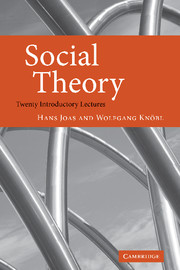Book contents
- Frontmatter
- Dedication
- Contents
- Introduction
- I What is theory?
- II The classical attempt at synthesis: Talcott Parsons
- III Parsons on the road to normativist functionalism
- IV Parsons and the elaboration of normativist functionalism
- V Neo-utilitarianism
- VI Interpretive approaches (1): symbolic interactionism
- VII Interpretive approaches (2): ethnomethodology
- VIII Conflict sociology and conflict theory
- IX Habermas and critical theory
- X Habermas' ‘theory of communicative action’
- XI Niklas Luhmann's radicalization of functionalism
- XII Anthony Giddens' theory of structuration and the new British sociology of power
- XIII The renewal of Parsonianism and modernization theory
- XIV Structuralism and poststructuralism
- XV Between structuralism and theory of practice: The cultural sociology of Pierre Bourdieu
- XVI French anti-structuralists (Cornelius Castoriadis, Alain Touraine and Paul Ricoeur)
- XVII Feminist social theories
- XVIII A crisis of modernity? New diagnoses (Ulrich Beck, Zygmunt Bauman, Robert Bellah, and the debate between liberals and communitarians)
- XIX Neo-pragmatism
- XX How things stand
- References
- Author index
- Subject index
XVIII - A crisis of modernity? New diagnoses (Ulrich Beck, Zygmunt Bauman, Robert Bellah, and the debate between liberals and communitarians)
Published online by Cambridge University Press: 05 June 2014
- Frontmatter
- Dedication
- Contents
- Introduction
- I What is theory?
- II The classical attempt at synthesis: Talcott Parsons
- III Parsons on the road to normativist functionalism
- IV Parsons and the elaboration of normativist functionalism
- V Neo-utilitarianism
- VI Interpretive approaches (1): symbolic interactionism
- VII Interpretive approaches (2): ethnomethodology
- VIII Conflict sociology and conflict theory
- IX Habermas and critical theory
- X Habermas' ‘theory of communicative action’
- XI Niklas Luhmann's radicalization of functionalism
- XII Anthony Giddens' theory of structuration and the new British sociology of power
- XIII The renewal of Parsonianism and modernization theory
- XIV Structuralism and poststructuralism
- XV Between structuralism and theory of practice: The cultural sociology of Pierre Bourdieu
- XVI French anti-structuralists (Cornelius Castoriadis, Alain Touraine and Paul Ricoeur)
- XVII Feminist social theories
- XVIII A crisis of modernity? New diagnoses (Ulrich Beck, Zygmunt Bauman, Robert Bellah, and the debate between liberals and communitarians)
- XIX Neo-pragmatism
- XX How things stand
- References
- Author index
- Subject index
Summary
The discourse on modernity within the social sciences worldwide has reached a new level of intensity since the 1980s. This discourse was partly stimulated by the criticisms of postmodern theorists. In a certain sense, it was the diagnosis of ‘postmodernity’ which led scholars to reflect on ‘modernity’. The assertion made by theorists of postmodernity that the conception of rationality characteristic of modernity is inevitably linked with aspects of power and can therefore by no means lay claim to universality was bound to inspire contestation. As we saw towards the end of Lecture X, authors such as Jürgen Habermas (The Philosophical Discourse of Modernity) refused to accept this assumption, sparking off a complex philosophical dispute over the foundations of modernity. But the discourse on modernity was not carried on solely with philosophical arguments. It also raised genuine social scientific questions, in as much as new problems arose in modern societies or there was a greater awareness of certain (old) problems than ever before. Sociology at least produced a number of spectacular diagnoses of the contemporary era, which were discussed not only within the discipline but which appealed to a broad public and demonstrated that, despite all the talk of disciplinary crisis, sociology can still contribute highly interesting analyses of contemporary societies. In this lecture we shall deal primarily with three authors who produced powerful diagnoses of the present era in the 1980s, whose effects continue to be felt to this day.
- Type
- Chapter
- Information
- Social TheoryTwenty Introductory Lectures, pp. 463 - 499Publisher: Cambridge University PressPrint publication year: 2009



